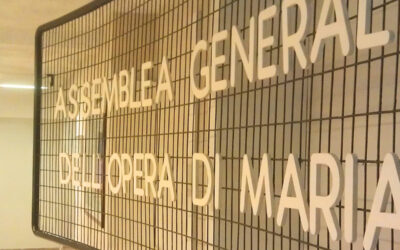 «First of all I thank His Eminence, Cardinal Stanisław Ryłko, for having invited me to take part in this press conference. I take this opportunity to publicly thank the Pontifical Council for the Laity for having promoted this 3rd International Meeting. With this I think that I am also expressing the feeling of many Ecclesial Movement and New Communities that enrich the Church and today’s society.
«First of all I thank His Eminence, Cardinal Stanisław Ryłko, for having invited me to take part in this press conference. I take this opportunity to publicly thank the Pontifical Council for the Laity for having promoted this 3rd International Meeting. With this I think that I am also expressing the feeling of many Ecclesial Movement and New Communities that enrich the Church and today’s society.
What does the Focolare Movement – and perhaps also the other Movements – expect from this Meeting?
First of all, I believe that this Meeting has been convoked at a suitable time and for many reasons: We are in the midst of the 50th anniversary of the Second Vatican Council. We find the whole Church, therefore all of us, faced with its great intuitions and teaching. Vatican II, especially for us laypeople, continues to be, and today more than ever, an encouragement and example of our role, vocation and responsibility towards the Church and the contemporary world.
Another reason for encouragement is the person of Pope Paul VI, who came to the fore on the occasion of his beatification, with his clear and often prophetical teaching, as the Pope of dialogue and the Pope of the laity.
Another great reason are the challenges that Pope Francis constantly presents to the whole Church, as an institution and the people of God. This is why us too, who belong to the Focolare Movement, feel the duty to be interrogated by his words and his choices. It’s not enough to appreciate, but we are working so that they may challenge us deeply, when it comes to strong convictions, openness and practicality.
The programme of the forthcoming 3rd Meeting, for what we know at the moment, will go over the important demands of the Evangelii gaudium. With these Pope Francis encourages and accompanies the Church towards the widest diffusion: he makes us penetrate all the “outskirts,” for which we live, with the duty of offering – with our being and our work – the light that comes from the certainty that “God loves us immensely”.
I would like to briefly mention our General Assembly, which took place two months ago. The participants included about 500 representatives of 137 countries, of all the branches, generations and dialogues that constitute the Movement. It practically concluded last September 26th with the private audience with Pope Francis.
 On that occasion, going through the journey of the Church called to a new evangelization 50 years from the Second Vatican Council, Pope Bergoglio wanted to give three “verbs” to the Movement. I noted a perspective in these words that – I think – can inspire, spur and interest also other associations of the Church.
On that occasion, going through the journey of the Church called to a new evangelization 50 years from the Second Vatican Council, Pope Bergoglio wanted to give three “verbs” to the Movement. I noted a perspective in these words that – I think – can inspire, spur and interest also other associations of the Church.
First: to contemplate. To contemplate God and live in the company of men and women; to persevere in mutual love, said the Pope citing a writing of our foundress Chiara Lubich, who «inspired by God in response to the signs of the times» – he said – wrote: “The great attraction of modern times: to penetrate the highest contemplation while mingling with everyone, one person alongside others.”
Second: to go out. I quote: «To go out … to generously communicate God’s love to all» with respect, gratuitousness and creativity. «In order to do this, we must become experts in that art which is called ‘dialogue’ and which is not learned cheaply. We cannot be content with half measures,» but «with God’s help we can aim high and broaden our gaze.» To go out with courage where there are «the moans of our brothers, the hurts of society and the questions of the culture of our time.»
Third: to teach. Pope Francis remembered the expression of Pope John Paul II in the Novo millennio ineunte, with which he invited the whole Church to become “the home and the school of communion” (cfr n. 43). And he added: «You have taken this instruction seriously. It is important to form, as the Gospel requires, new men and women and to that end a human school according to the measure of Jesus’ humanity, is necessary. … Without an appropriate formation of the new generations, it is illusory to think that a serious and lasting plan in service of a new humanity can be brought about.» We must form “global persons,” he said citing an expression «that Chiara Lubich coined … which is especially relevant today … men and women with the soul, the heart, the mind of Jesus and therefore capable of recognizing and interpreting the needs, the concerns and the hopes which are harboured in the heart of every person.»
These three verbs blend with the three words that emerged from the General Assembly of the Focolare. We were trying to gather the essence from the 3,650 proposals that arrived during the preparatory months from the communities of the Focolare throughout the world and to offer guidelines for the future. They are three words that synthetically indicate the commitment and perspectives of the Movement in the next years: “going outwards, together, suitably prepared.”
This upcoming 3rd Meeting of the Ecclesial Movements and New Communities is part of a common and fruitful history, which has witnessed Movements be born, develop and give their own contribution to the Church and humanity, according to the specific charism each one possessed. Not only this. Very often, especially after the founding moment of Pentecost 1998, it has also seen various Movements and/or Communities collaborating together in various projects and on different moments.
The Pontifical Council for the Laity has always been alongside us in this working together. In this way it gave us the guarantee that what each Movement brought was needed for the fulfilment of a project for the good of the whole ecclesial body. It always watched over us with love and discernment appreciating the good and knocking down all the secondary things there could have been. Many times the Focolare Movement, with its charism of unity, felt sustained in promoting all kinds of meetings that at times were complex, as for example the youth day meetings or the Laity Meetings, like the one held in Korea…
Following this history, we hope that the upcoming Meeting may mark a step of maturity. May the reflections, exchanging of views, the sharing of successes and failures, the experiences and projects create the conditions for God, Lord of history, to draw from this not only fruits of communion and mutual enrichment, but the fruit of making everyone, all together, focus better, to look and always live with renewed joy for the only great goal of the Church of Christ: “That they may all be one … Father” (Jn 17:21). This is “God’s dream.” We hope to be able to respond to the deepest longings of men and women today and help make humanity one big family. In this way we prepare ourselves to meet all the participants at the Meeting.»
From the speech of Maria Voce at the press conference presenting the 3rd Meeting of Ecclesial Movements and New Communities




0 Comments